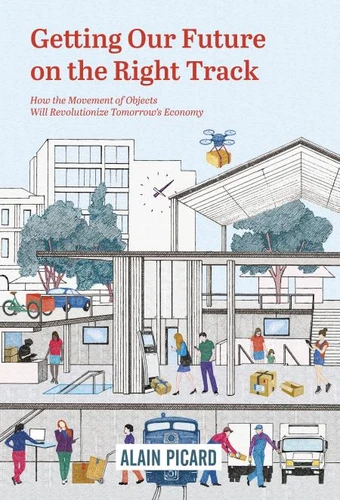Getting Our Future on the Right Track. How the Movement of Objects Will Revolutionize Tomorrow's Economy
Par :Formats :
Disponible dans votre compte client Decitre ou Furet du Nord dès validation de votre commande. Le format Multi-format est :
- Pour les liseuses autres que Vivlio, vous devez utiliser le logiciel Adobe Digital Edition. Non compatible avec la lecture sur les liseuses Kindle, Remarkable et Sony
 , qui est-ce ?
, qui est-ce ?Notre partenaire de plateforme de lecture numérique où vous retrouverez l'ensemble de vos ebooks gratuitement
Pour en savoir plus sur nos ebooks, consultez notre aide en ligne ici
- Nombre de pages144
- FormatMulti-format
- ISBN978-2-37509-036-7
- EAN9782375090367
- Date de parution26/03/2018
- Protection num.pas de protection
- Infos supplémentairesMulti-Format
- ÉditeurDébats Publics
Résumé
We need an efficient and innovative logistics sector to deal with constantly-changing patterns of consumption and enable manufacturing businesses to thrive. Should we just look on while others show us the way? Alain Picard argues that logistics, the "oxygen of the economy", will be essential to wealth creation in the coming decades. In spite of this, it is too often under-estimated. That needs to change: you can't have an economy built on trade without moving objects!
Logistics has ambitious aims: to make things flow more smoothly, support the development of our companies, meet demands for immediacy and proximity, and simplify everyday life.
This ever-changing "invisible machine" is tackling head-on future challenges such as drones, connected railcars, green logistics, data mining and infrastructure development. What's the best of way of bringing about successful change and inno- vation in this sector? Alain Picard believes France must play a full part in national and European developments. He also argues it is vital to kick-start social mobility with support for jobs that are hard to delo- calize.
Another key challenge will be to bridge the gap between what consumers want and what citizens need. France has assets with huge potential: logistics businesses that could play a crucial role in boosting growth, performance and the country's global standing.
This ever-changing "invisible machine" is tackling head-on future challenges such as drones, connected railcars, green logistics, data mining and infrastructure development. What's the best of way of bringing about successful change and inno- vation in this sector? Alain Picard believes France must play a full part in national and European developments. He also argues it is vital to kick-start social mobility with support for jobs that are hard to delo- calize.
Another key challenge will be to bridge the gap between what consumers want and what citizens need. France has assets with huge potential: logistics businesses that could play a crucial role in boosting growth, performance and the country's global standing.
We need an efficient and innovative logistics sector to deal with constantly-changing patterns of consumption and enable manufacturing businesses to thrive. Should we just look on while others show us the way? Alain Picard argues that logistics, the "oxygen of the economy", will be essential to wealth creation in the coming decades. In spite of this, it is too often under-estimated. That needs to change: you can't have an economy built on trade without moving objects!
Logistics has ambitious aims: to make things flow more smoothly, support the development of our companies, meet demands for immediacy and proximity, and simplify everyday life.
This ever-changing "invisible machine" is tackling head-on future challenges such as drones, connected railcars, green logistics, data mining and infrastructure development. What's the best of way of bringing about successful change and inno- vation in this sector? Alain Picard believes France must play a full part in national and European developments. He also argues it is vital to kick-start social mobility with support for jobs that are hard to delo- calize.
Another key challenge will be to bridge the gap between what consumers want and what citizens need. France has assets with huge potential: logistics businesses that could play a crucial role in boosting growth, performance and the country's global standing.
This ever-changing "invisible machine" is tackling head-on future challenges such as drones, connected railcars, green logistics, data mining and infrastructure development. What's the best of way of bringing about successful change and inno- vation in this sector? Alain Picard believes France must play a full part in national and European developments. He also argues it is vital to kick-start social mobility with support for jobs that are hard to delo- calize.
Another key challenge will be to bridge the gap between what consumers want and what citizens need. France has assets with huge potential: logistics businesses that could play a crucial role in boosting growth, performance and the country's global standing.







